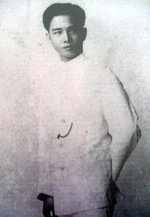Wang Jingwei
| Surname | Wang |
| Given Name | Jingwei |
| Born | 4 May 1883 |
| Died | 10 Nov 1944 |
| Country | China |
| Category | Government |
| Gender | Male |
Contributor: C. Peter Chen
ww2dbaseWang Jingwei was born in Sanshui in the Guangdong Province of China. He studied in Japan in 1903, sponsored by the Qing Dynasty government. He was placed in jail in 1905 in China for being associated with an assassination attempt against the Second Prince of Chun of Qing, but was freed in during the Wuchang Uprising in 1911. The Wuchang Uprising would be the start of the Chinese Revolution, upon which Dr. Sun Yat-sen laid the foundations for the infant Republic of China. In the subsequent years, Wang would become a top political figure in Sun's government, but when Sun passed away in 1925, Wang faced challenges in maintaining his high rank within the Nationalist Party, as the party majority favored Chiang Kaishek. During Chiang's Nothern Expedition of 1926 to 1928, Wang urged Chiang to ally with the Communists and cease the continuing attacks, but was ignored. Wang's faction, feeling their voices unheard, established their own headquarters in Wuhan in Hubei Province, China, but lack of military and financial support caused it to collapse after a short time. In 1930, Wang attempted a coup against Chiang, supported by Feng Yuxiang and Yan Xishan, but it would be defeated by Chiang's forces during the Central Plains War. He reconciled with Chiang and was appointed the position of Premier, serving that position between 1932 and 1935. He held various posts at the temporary Chinese capital of Chongqing in 1937 (the capital city of Nanjing having evacuated due to Japanese advance). Very shortly after, in 1938, Wang left the Nationalist Party to negotiate with the Japanese in Shanghai. He attempted to negotiate a separate peace treaty with the Japanese while Chiang resisted any form of negotiation with the Japanese. Wang thought that peace could be achieved even if it meant bowing down to the Japanese conquerors. He would become the head of a puppet regime based in Nanjing on 30 Mar 1940 as the president. This government was recognized internationally only by Germany and Japan as a legitimate government. He passed away of sickness four years later in Nagoya, Japan; some said that he was poisoned by agents under the command of Nationalist Chinese intelligence chief Dai Li.
ww2dbaseWang Jingwei had been regarded as a traitor (hanjian) by most Chinese, though his intentions were argued by some as good. He was not a pro-Japanese politician by any means, rather, he deeply believed in maintaining peace during resistance (yimian dikang, yimian jiaoshe) even though it was not a popular approach. He believed that bringing peace to the Chinese people (heping yundong) was far more important than the military resistance Chiang Kaishek insisted (unless, according to Chiang, that China's soverignty and territorial claims were fully restored to the Nationalist Party). Politically, Wang attempted to merge Sun Yatsen's ideas on pan-Asianism and the Japanese New Order (Greater Eastern Asia Economic Region under Japanese control), however, the Chinese national pride, plus Chiang's propaganda, made it difficult to pursue such a course.
ww2dbaseSource: Chinese Collaboration with Japan, Wikipedia
Last Major Revision: Feb 2005
Wang Jingwei Interactive Map
Photographs
 |  |
Videos
 |
Wang Jingwei Timeline
| 4 May 1883 | Jinwei Wang was born in Sanshui, Guangdong Province, Qing Dynasty China. |
| 30 Mar 1940 | Japan installed a puppet government in Nanjing, China under the leadership of Wang Jinwei. |
| 30 Nov 1940 | Wang Jingwei of the Japanese-sponsored puppet government in Nanjing, China established diplomatic relationship with fellow puppet state Manchukuo. |
| 10 Nov 1944 | Jingwei Wang passed away in Nagoya, Japan. |
| 12 Nov 1944 | Jingwei Wang's death in Japan two days prior was announced in China, after commemorative events for Sun Yat-sen's birth had concluded. |
Please consider supporting us on Patreon. Even $1 per month will go a long way! Thank you. Please help us spread the word: Stay updated with WW2DB: |
Visitor Submitted Comments
All visitor submitted comments are opinions of those making the submissions and do not reflect views of WW2DB.

» Greater East Asia Conference
Related Books:
» China's World War II 1937-1945: Forgotten Ally
- » 1,177 biographies
- » 337 events
- » 45,081 timeline entries
- » 1,245 ships
- » 350 aircraft models
- » 207 vehicle models
- » 376 weapon models
- » 123 historical documents
- » 261 facilities
- » 470 book reviews
- » 28,492 photos
- » 365 maps
Lt. Gen. Lewis B. "Chesty" Puller, at Guadalcanal
26 Jun 2010 06:52:43 PM
During the Vietnam war era, when I was in high school. One of my teachers mentioned that someday the history will clear the bad name to Mr. Jinwei Wang but not by current government- The Chiang Kaishek's one. and we all quiet. That's the most toughest word in that year... If some one report it. The teacher will be jailed.. In Chiang's dynasty in Taiwan (1960 - 1970).
Thanks for the info.